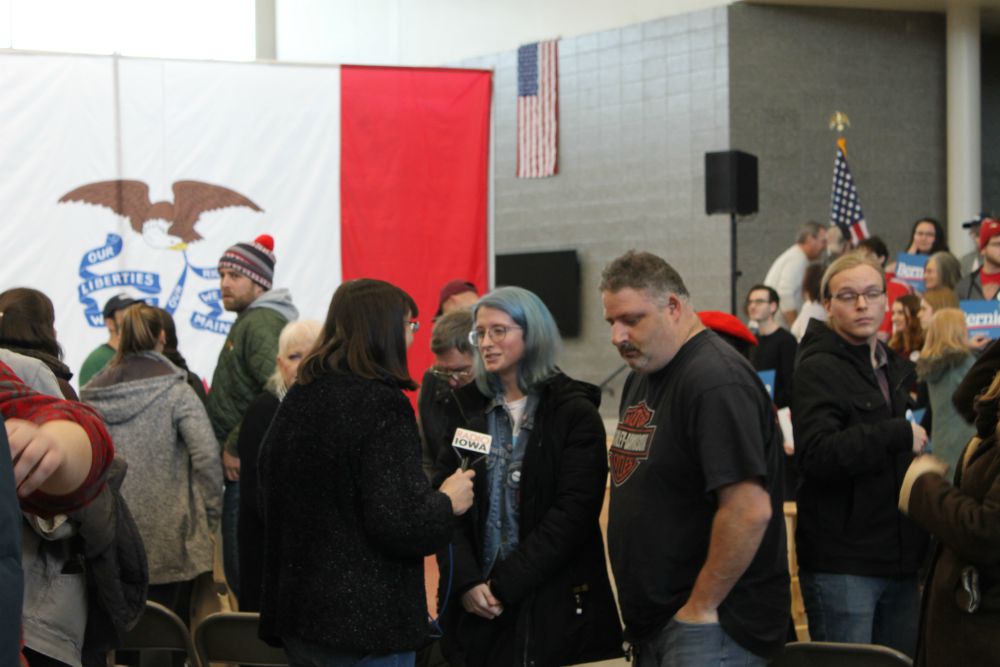
Voters speak with a reporter for Radio Iowa following a town hall Jan. 11 for Sen. Bernie Sanders at Berg Middle School, in Newton, Iowa. (NCR photo/Brian Roewe)
On a snow-covered January morning in central Iowa, Amy Moore arrived more than an hour early to save her daughter a front-row seat for Sen. Bernie Sanders' town hall here at Berg Middle School.
The cold couldn't keep away Moore, who was disappointed the hottest temperatures since the 1930s this year prevented a white Christmas. As for the candidates, the 45-year-old college professor and Catholic mother of five, like her daughter, has warmed to Sanders (Vermont), along with Sen. Elizabeth Warren (Massachusetts).
"They are ready to make changes to things that need to be changed. Most specifically, the wage gap, which I feel is tearing apart our country right now," she said of the two progressive senators.
As a Catholic, Moore looks for candidates who live their religious beliefs, rather than simply talk about them. When it comes to the two New England candidates, she's drawn toward "just their desire to take care of everyone." While she caucused for Sanders in 2016, she was leaning toward Warren this time.
"They have such similar political beliefs, and I think it's time for a woman," Moore told NCR.
Just over three weeks before the first votes will be cast in the 2020 presidential election, many of the dozen Democratic Catholic voters in Iowa who spoke to NCR had narrowed the field, though not yet made up their minds for which candidate they would caucus.
But one certainty was well established: Anybody but Trump.
"I'll vote for Peter Pan if he beats Trump," said Jan Brown, a parishioner at Our Lady's Immaculate Heart in Ankeny, Iowa, a suburb north of Des Moines.
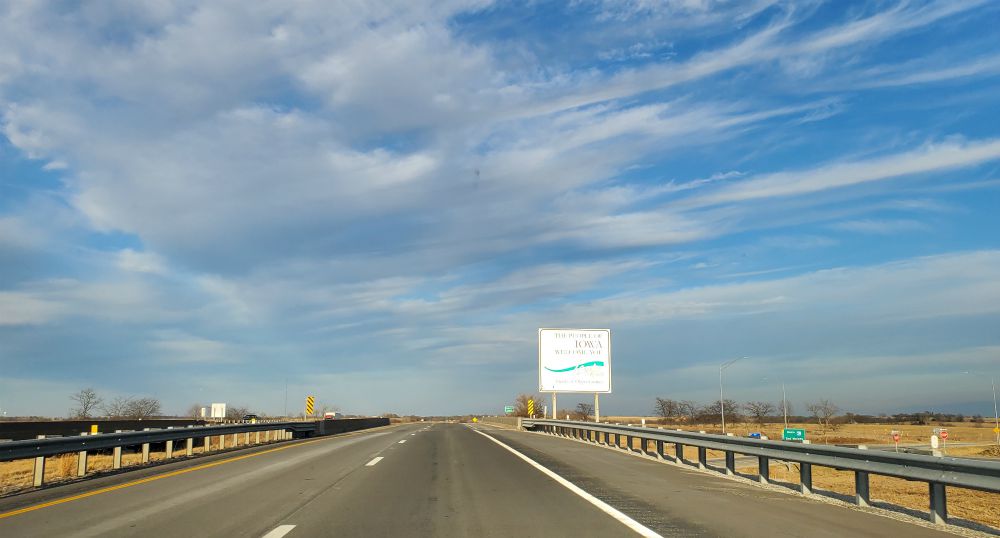
Iowans will head to schools, churches and community spaces on Feb. 3 as part of the Democratic caucuses, the first time voters will weigh in on the 2020 presidential election. (NCR photo/Brian Roewe)
Still fluid
In the neighborhood surrounding the Newton school, residents shoveled out driveways on the quiet Saturday morning. Few displayed political signs in their snow-covered yard. Spotted were one supporting Warren and another for South Bend Mayor Pete Buttigieg. Part of Jasper County, one of the 31 Iowa counties that flipped to Donald Trump after twice voting for Barack Obama for president, campaigns and political observers will be watching closely how voters here will line up Feb. 3 on caucus night.
"I think it's still really fluid," said Kathie Obradovich, a former political editor and columnist for the Des Moines Register and editor-in-chief of the recently launched Iowa Capital Dispatch. Her husband, Jim, is a deacon for the Des Moines Diocese.
Part of that is due to the large field of candidates — currently a dozen, with 16 already dropped out. Another factor is policy similarities among certain candidates. Combined, it takes a lot of time to review so many candidates and parse through policies. And while nearly all agree that the ability to beat Trump in a general election is paramount, there's not consensus on what that will take.
In the latest Iowa Poll, released by the Des Moines Register a day before the Sanders town hall in Newton, 40% of likely Democratic caucusgoers indicated they had selected their candidate, compared to 45% open to persuasion to jump from their current favorite. Another 13% had not picked a top candidate.
The Jan. 10 Iowa poll continued to show the top-four candidates as Sanders (20%), Warren (17%), Buttigieg (16%) and former Vice President Joe Biden (15%). Buttigieg narrowly led the other three in voter footprint, or percent of voters considering him as their first or second choice or still considering him at all.
Second choices have always played a critical role in the caucuses, but could factor even more in 2020 with such a large presidential pool. For instance, supporters of Sen. Amy Klobuchar (Minnesota) and entrepreneur Andrew Yang, polling at 6% and 5%, respectively, could play decisive roles on caucus night, as supporters for any candidate who doesn't receive 15% support at each precinct — the viability threshold — must then realign with a remaining candidate.
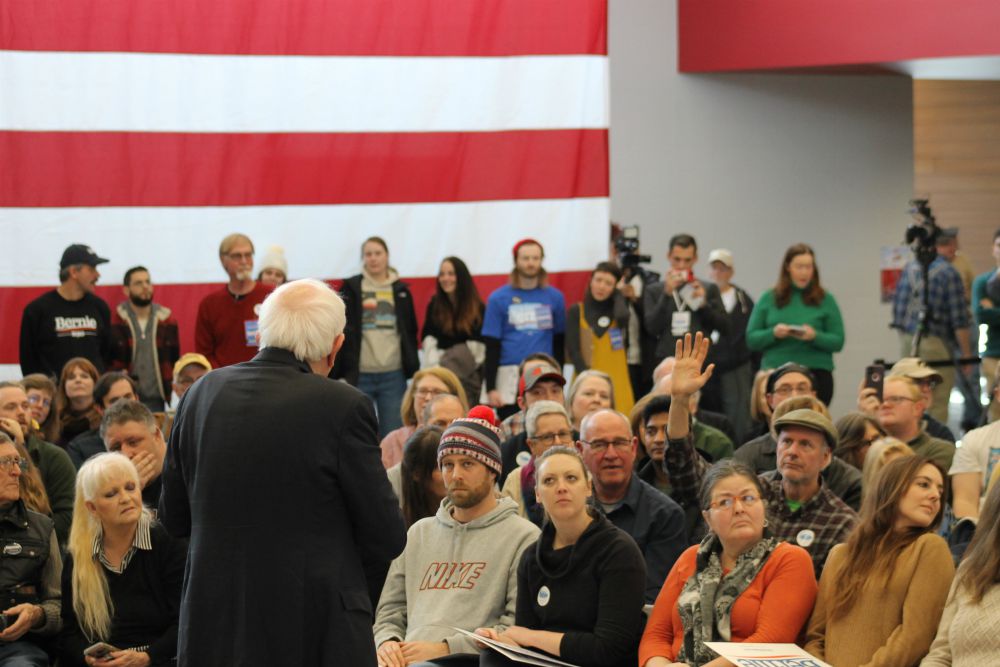
U.S. Sen. Bernie Sanders takes a question from a voter at a town hall event Jan. 11 at Berg Middle School in Newton, Iowa. (NCR photo/Brian Roewe)
Add to that the state Democratic Party, in a nod to transparency, for the first time will report not only the final delegate count, but the results of both the first alignment and final alignment, leaving the possibility for several candidates to declare victory.
Meaning the traditional "three tickets out of Iowa" this cycle might offer a few standby slots.
"Iowa may not winnow the field as much as people normally expect. Just because there's a chance to be more than one winner," Obradovich said.
On the issues, Iowa voters listed their top three as health care, climate change and the nation's wealth gap. In terms of what they looked for in a candidate, 58% of respondents said the ability to win in the November general election was extremely important, just 1 percentage point ahead of sharing the same policy positions. The top quality? The ability to unite the country, cited by nearly 7-in-10 likely caucusgoers.
Looking for a winner
Electability and bringing people back together are issues that has Brown looking at Biden. But she concedes Klobuchar would be her first choice — she's just not sure she can win.
"I think Biden has a better chance of beating Trump," said Brown, a retired dental hygienist and the Our Lady's Immaculate Heart rep for AMOS, a mid-state religious advocacy group for common good issues like affordable housing and mental health care.
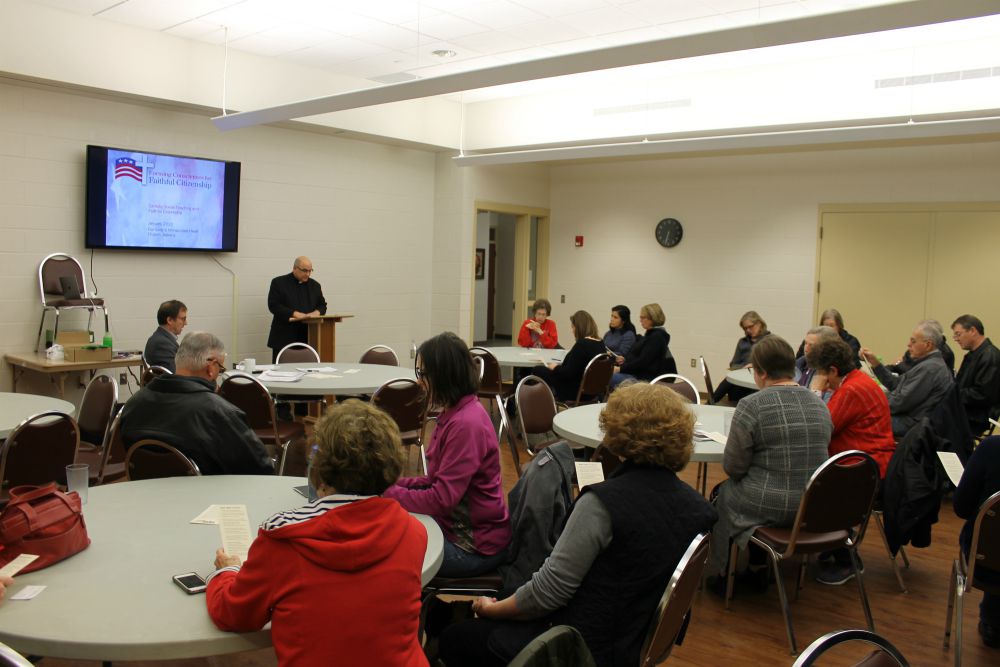
Fr. Michael Amadeo speaks at the beginning of an event Jan. 9 on the U.S. bishops' election document "Faithful Citizenship" at Our Lady's Immaculate Heart Catholic Church, in Ankeny, Iowa. (NCR photo/Brian Roewe)
She was among more than three dozen Catholics who attended a presentation Jan. 9 at the suburban parish on the U.S. bishops' election document, "Faithful Citizenship." In a roundtable discussion afterward, six parishioners and Fr. Michael Amadeo discussed the upcoming election and the candidates — often on a first-name basis.
Dixie Webb, 68, and her husband Barney Webb, 63, have whittled their caucus candidates down to Sanders and Warren. Dixie, a retired school librarian and chair of the parish peace and justice committee, listed her top issues as climate change, health care and immigration. For Barney, a salesman, it was health care and a living wage. In 2016, both caucused for the Vermont senator.
The pastor Amadeo, 55, said that should he caucus, it will be for Buttigieg. His top issues include addressing immigration and health care.
Mary Wooliver, 70, is a retired X-ray technologist who worked at Mercy Hospital in Des Moines. Also concerned about immigration and health care, she's leaning toward Warren and Klobuchar. So too is Janette Bauer, a retired clinical nutritionist, but she said she may arrive at her caucus site uncommitted. In terms of issues, she added the court system and the environment, and was happy Democratic candidates have begun to really address the latter.
"We've had flooding in Iowa how many years? … Whether you call it global warming, climate change or what, there's something happening and we need to do everything possible to stop what's going on," Bauer said.
Like his wife, Greg Wooliver also now likes Klobuchar, though he's bounced around from Sanders and Warren — "in terms of policies and issues, Bernie and Elizabeth resonate well," especially in addressing the wealth gap — to Rep. Tulsi Gabbard (Hawaii) for her anti-war stance, to Buttigieg. For now, he plans to start with Klobuchar, then maybe Sanders but he isn't quite sure.
Advertisement
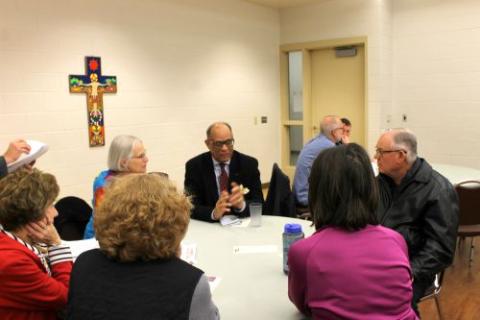
Parishoners, including Dixie Webb, left of center, discuss Catholic participation in politics during an event Jan. 9 on the U.S. bishops' election document "Faithful Citizenship" at Our Lady's Immaculate Heart, in Ankeny, Iowa. (NCR photo/Brian Roewe)
"Like all the rest of you [think], whoever can win, " he said. "And all these issues, they matter and you're drawn to them, but really it is first: Which one can win?"
As the likely caucusgoers talked, there was a notable lack of excitement around Biden, a fellow Catholic, while half expressed an openness to Klobuchar, a moderate they described as non-inflammatory, capable of working across the aisle and perhaps pull some Republicans to her candidacy.
It was a personal encounter with Klobuchar that solidified her as the candidate of choice for Maryfrances Evans, a former KCCI news director and now executive director for Iowa Radio Reading Information Service, which serves a print-disabled audience of 11,000 statewide. In a moment perhaps only likely in Iowa, the senator spent an impromptu 20 minutes coloring and talking with one of Evans' teenage daughters while she attended an LGBTQ summer camp as an ally.
"She did not have time to do that. She had no reason to do that. She didn't know who I was voting for. But just she was so human," said Evans, 57, a parishioner of St. Catherine of Siena Catholic Church at Drake University.
She described Klobuchar as pragmatic and "extraordinarily grounded." And if she doesn't end up as viable, then it's "electability all the way."
Teresa Parmenter, 77, often talks politics with friends at the Doughnut Hut, their regular spot after daily Mass at Holy Trinity Church in Des Moines' Beaverdale neighborhood. She believes her first vote will be for Buttigieg. She views him as addressing the needs of the average person, including stagnant wages — a persistent theme in his campaign ads running in the state.
Parmenter also likes that he's a bit younger (37) than other candidates, and holds age against her fellow septuagenarians (Sanders, Biden, Warren) in the field. Another candidate turnoff? Talking only about beating Trump without a clear plan to do so. She concedes Warren has a plan, "but it's just a little too far to the left."
"But I do agree that we need a change from what we have right now," she told NCR, "because I don't think what we have right now is good for our country in domestic or international relations at all."
The question of whether there is a "Catholic vote" in Iowa most often leads political watchers to Dubuque County, where over half the 96,000 residents identify as Catholic. With the college city of Dubuque surrounded by rural communities, it is another Obama-Trump swing county that then saw its congressional seat turn blue in the 2018 midterms.
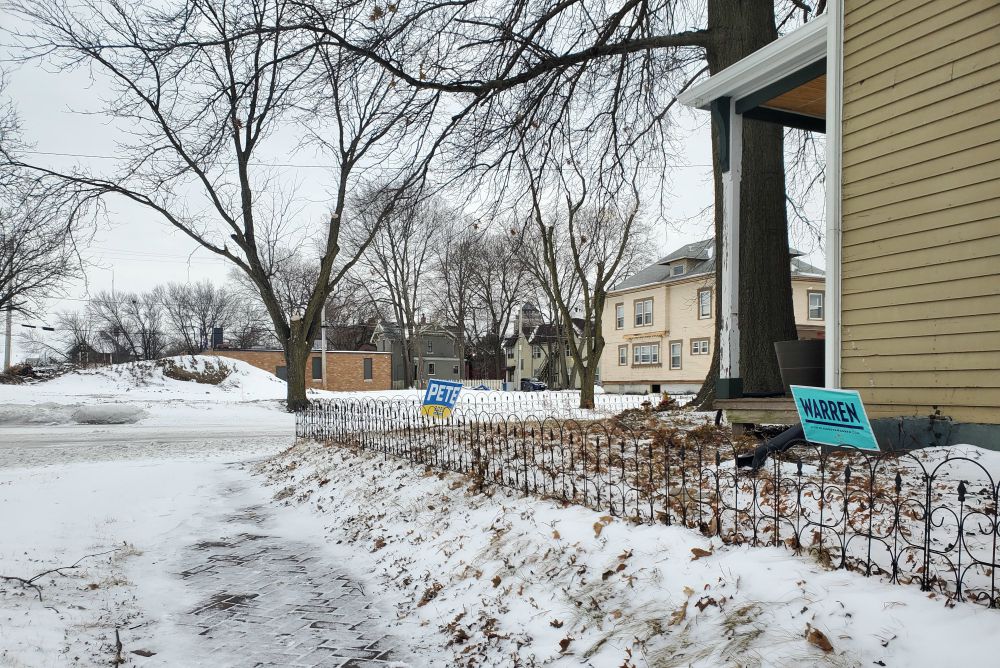
Political signs endorsing U.S. Sen. Elizabeth Warren of Massachusetts and Pete Buttigieg, mayor of South Bend, Indiana, are seen in a yard in Des Moines, Iowa. (NCR photo/Brian Roewe)
Enthusiasm high
While candidate selection continues, voters and observers largely agree that enthusiasm for this election is sky high. Several compared the energy to levels seen during Obama's 2008 campaign.
Evans, who will serve as a temporary caucus chair for her tiny precinct in Des Moines' Dogpatch neighborhood, is expecting a big crowd on caucus night. Even local party meetings have seen record attendance, she said. Polk County is expecting a large turnout and has sought out bigger caucus venues to accommodate.
Pin it partly to the large field of candidates. But mostly to disapproval with Trump.
"For a lot of people, the shock of the 2016 presidential election is still extremely fresh. And I don't think motivation to change the current president, to get a new president, I don't think that has dimmed at all," Evans said.
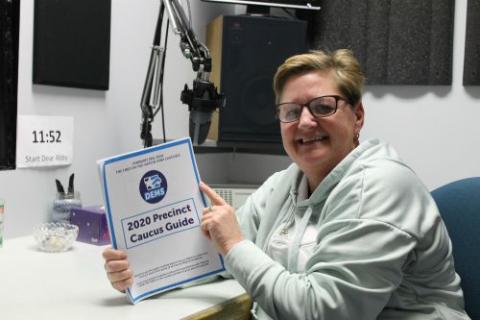
Maryfrances Evans, a parishioner of St. Catherine of Siena Catholic Church at Drake University, will serve as a temporary caucus chair for her Webster 1 precinct. "There's so much math involved in caucus night," she said, referencing the counting to determine which candidates reach the 15% viability standard. (NCR photo/Brian Roewe)
Other signs of enthusiasm are in the air.
In past election cycles, Bauer, one of the Our Lady's Immaculate Heart parishioners, had few campaigners knocking at her door. This year has been different, including a young mother with a toddler and baby stumping for Buttigieg. "She really supports Pete to be doing that," she said.
A regular measuring stick of candidate enthusiasm and organizing acumen is the Liberty and Justice Dinner held by the state Democratic Party. The event gives campaigns an opportunity to display, to the party and watching media, their mobilizing moxie and the enthusiasm behind their candidates. Obradovich, the editor of the Iowa Capitol Dispatch, said three of the front-runners — Sanders, Warren and Buttigieg — had strong showings this year, while the Biden campaign lagged.
Campaigns depend heavily on raising high enthusiasm, she told NCR, because of the nature of the caucus system, which "requires an intensely personal campaign" to organize supporters to commit to caucus, which can sometimes last hours.
"They have to feel like they have a personal relationship with the candidate and or a personal relationship with core supporters of the candidate," she said.
Each election cycle renews the debate around whether caucuses — which have historically low turnout; in 2016, roughly 16% of the population participated in both parties' caucuses — are the best way to select candidates, or whether Iowa, a mostly rural state with little racial diversity, should be the first to scrutinize presidential hopefuls. Still, since the caucus system was implemented in 1972, the Hawkeye State has selected the eventual Democratic nominee in 7 of 10 presidential elections, though only two — Obama and Jimmy Carter — went on to win the general election.
With the caucuses requiring a significant time commitment, any number of factors can influence turnout, and with it, results. Night shifts. Evening classes. Even the weather.
Should another snowstorm strike Iowa near caucus night, Obradovich predicted it could mean older voters opt to stay home and perhaps lead to a big night for Sanders, who leads the field among younger voters and also has the most enthusiastic supporters.
"When you add bad weather into the mix, it's the most ardent and committed people who show up," Obradovich said.
[Brian Roewe is an NCR staff writer. His email address is broewe@ncronline.org. Follow him on Twitter: @BrianRoewe.]







